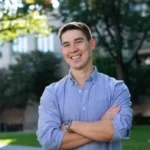Historic Massachusetts Law to Support Veterans Signed into Law – with Help from LSC Students
Three students in the Veterans Law and Disability Benefits Clinic—David Paul ’24, Basundhara Mukherjee ‘24, and Nathan Lowry ‘24—provided important testimony to state legislators that helped lead to the passage of the HERO Act (An Act Honoring, Empowering, and Recognizing our Servicemembers and Veterans), the most comprehensive law for military veterans in Massachusetts history.
Sign into law on August 8 by Massachusetts Governor Maura Healey, the Act includes over 30 provisions that will affect hundreds of thousands of veterans in the state, including nearly 30,000 women veterans and thousands of LGBTQ+ veterans. It expands access to behavioral health treatment, increases benefits for veterans with significant disabilities, supports businesses that hire veterans, expands the definition of a veteran, broadens the Veterans Equality Review Board’s scope, and codifies medical and dental benefits, among other things. It also provides greater procedural protections and substantive benefits for veterans and their families in accessing the Chapter 115 veterans benefits program, which provides financial support to help with basic needs such as food, shelter, and medical expenses (The Massachusetts Veteran Benefit Calculator is a tool that helps veterans quickly and easily determine if they may be eligible for financial assistance through Chapter 115.)
The LSC students testified before the Massachusetts Veterans and Federal Affairs Committee in support of a number of amendments and changes that are included in the final version of the law. These include changes to expand the definition of a “veteran” to recognize the complex circumstances that can lead to a veteran receiving a less-than-honorable discharge, such as experiences of combat or military sexual trauma, Post-Traumatic Stress Disorder or Traumatic Brain Injury, or discrimination on the basis of race or LGBTQ+ identity. The students also advocated for amendments that set deadlines for decisions in Chapter 115 applications by Veterans Service Officers and the Mass. Executive Office of Veterans’ Services and require an annual report on the Chapter 115 program.
While students in the Clinic, Paul, Mukherjee, and Lowry represented veterans who had been denied Chapter 115 benefits in administrative and court appeals. Their experiences listening to and advocating for their veteran clients gave them first-hand knowledge of some of the ways this critical safety-net program could be improved through legislative advocacy and reform. Mukherjee told of an elder veteran she represented who relied on Chapter 115 benefits for food, rent, and other basic needs, but whose benefits were abruptly terminated without proper notice. Although he won an appeal and received two years’ worth of retroactive benefits, his experiences “underscore the importance of elevating veterans’ dignity and unique needs when administering this program,” she testified.
“Though there is more work to be done, it is a major milestone that the students had a part in helping happen,” says Dana Montalto, Associate Director of the Veterans Legal Clinic. Also deeply impactful was the earlier testimony of one of the Clinic’s clients, an Army veteran who had experienced homelessness and whom the Clinic was representing in a Chapter 115 appeal. The combination of the veteran’s personal story and the students’ testimony provided a layered account of how reforms to the law were necessary in order to improve lives of the Commonwealth’s most vulnerable veterans, Montalto says.
LSC’s work on behalf of the new law was done in partnership with Veterans Legal Services (VLS), which provides frees civil legal aid services to economically disadvantaged military veterans in Massachusetts, and Massachusetts Law Reform Institute (MLRI), which provides statewide advocacy for laws and policies to secure economic, racial, and social justice for low-income people and communities. “We are grateful for the opportunity to partner closely with VLS and MLRI on legislation that will have such an enormous impact on the lives of veterans,” says Daniel Nagin, faculty director of LSC and the Veterans Legal Clinic.
“The superb work that David, Basundhara, and Nathan undertook continues a long tradition of advocacy at LSC,” Nagin adds. “Our model involves students being out front seizing opportunities for first-chair experiences. It also involves supporting students as they draw on their representation of individual clients to inform wider strategies for systemic change. We are so pleased that these three outstanding students could play a role in helping to bring about much-needed reforms to improve the lives of Massachusetts veterans.”



